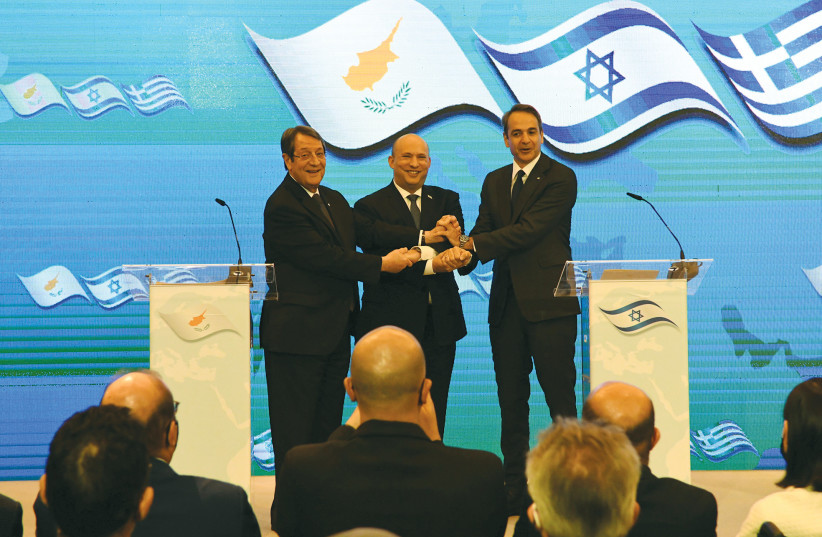President Isaac Herzog’s decision to meet with the presidents of Greece and Cyprus ahead of his much talked about trip to Turkey at the invitation of his Turkish counterpart, President Recep Tayyip Erdogan, is a wise move.
Herzog’s planned visit to Turkey, the first by an Israeli leader in more than a decade, is surely significant, and hopefully a harbinger of a renewed relationship between the two once-close allies, following a long period of tensions and animosity emanating from Erdogan.
But that potential rapprochement shouldn’t come at the expense of the strong alliance that has been forged among Israel, Greece and Cyprus. The three countries held their eighth trilateral meeting in December, this time in Jerusalem and with the participation for the first time of Prime Minister Naftali Bennett.
Among the topics discussed were major energy projects undertaken by the three nations, including the $7 billion EastMed gas pipeline, meant to transfer natural gas from Israeli waters to Europe via Greece and Cyprus, and the $9 billion Euro-Asia Interconnector, the world’s longest and deepest undersea power cable that will help prepare the region for a clean energy transition.
At a joint news conference with the heads of Greece and Cyprus – Greek Prime Minister Kyriakos Mitsotakis and Cypriot Prime Minister Nikos Anastasiades, respectively – Bennett stated that the trilateral alliance is “good for our people, good for our countries and good for the region.”

Claims over natural gas in the Eastern Mediterranean have been a point of contention with Turkey in recent years, with Ankara saying it should be part of the EastMed project. Last month the Biden administration walked back from support of the project, expressing reservations of its economic viability, but seen as an attempt to bring Turkey into the regional equation.
Erdogan took the opportunity of the US withdrawing its support to say: “[If Israeli gas] would be brought to Europe, it could only be done through Turkey. Is there any hope for now? We can sit and talk about the conditions.”
Engaging Erdogan can certainly be beneficial for regional stability and for Israel’s economic and security considerations. However, before diving headfirst into a renewed romance, it’s prudent to remember some less-savory aspects of the Turkish strongman.
Erdogan has regularly insulted, criticized and slandered Israel, whenever given the chance. He accused Israel of intentionally killing Palestinian children, and state-controlled media outlets have broadcast antisemitic television series.
Last month, the Turkish Foreign Ministry criticized Israel for evicting Palestinians who had illegally built their homes and businesses on public land, and Turkey openly harbors Hamas terrorists.
Let’s not forget that for over a decade, Erdogan has increasingly cut off ties with Israel, beginning in 2008 when Israel launched Operation Cast Lead.
The 2010 Mavi Marmara debacle worsened the relationship, but the cold ties remained intact. However, following the IDF’s quelling of rioting on the Gaza border in 2016, Ankara expelled Israel’s ambassador.
That’s a long trend of public hostility to reverse. And smartly, Israel seems to be treading cautiously.
“Things are happening very slowly and gradually,” Bennett said, while praising Herzog’s role in reestablishing the relationship with Erdogan.
At the same time, a senior diplomatic source told the Post’s Lahav Harkov: “We don’t have to force ourselves to be purists in a way that will prevent us from creating alliances.” The source pointed out this week’s visit by Erdogan to the UAE after years of tension.
The signs of a thaw in the cold relationship between Israel and Turkey are encouraging. Turkish Deputy Foreign Minister Sedat Önal and Ibrahim Kalin, Erdogan’s senior adviser and spokesman, were in Israel on Wednesday to discuss the planned visit by Herzog, who has spoken on the phone to Erdogan many times since he took office last year.
However enticing is that renewal of friendly and close ties, it must be tempered with cautious diplomacy. The announcement that Herzog will pay visits to Athens and Nicosia is a clear sign to all involved that a rapprochement with Ankara will not come at the expense of the equally important close ties Israel has developed with Greece and Cyprus in recent years.
